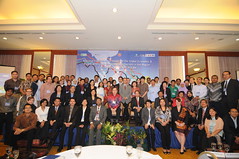Background of the Activity
The unregulated global financial system has led to serious and widespread economic downturn negatively affecting millions of highly vulnerable sectors in the region. This is happening in the midst of interlinked crises in relation to food, energy and climate change, arising from both governance and market failure.
Finding solutions to the global crises has now become the major concern across the globe of various instituions, including civil society itself and grassroots organizations. In Southeast Asia, this has become more compelling since a large section of its population lives below the poverty line. Civil society organizations have tackled this issue within their own organizations and across sectors, at various levels the past year, some of these as parallel CSO activities during the ASEAN Peoples' Forum held in Bangkok in February 2009, in conjunction with the 14th ASEAN Summit.
ASEAN likewise has convened a High-Level Forum on Reducing Vulnerability in the Face of Crisis last February 19-20, 2009 which acknowledged that the current financial crisis is a recurring phenomenon, with a much wider scale of impact affecting the ASEAN+3 Countries at various levels, given the differing contexts and the commonalities by which the financial crisis is affecting the region. It also acknowledged that new vulnerable groups are emerging and vulnerabilities are deepening in the societies due to the social impact of the financial crisis, thus the need to address the challenges comprehensively through a cross-sectoral regional plan.
At the global level, the United Nations recently concluded the UN Conference on the World Financial and Economic Crisis and its Impact on Development, to take stock of the causes of the crisis, consider existing policy responses and necessary reforms, and catalyze further concerted action.
Given all these developments, and in recognition of the need for a collaborative response among various stakeholders, a regional dialogue between and among CSO representatives, ASEAN leaders, and development stakeholders shall be convened to provide an opportunity to listen to peoples voices on the crisis and define concrete policies and programs to address the persisting challenges of the financial crisis in an already compounded development situation in the region.

